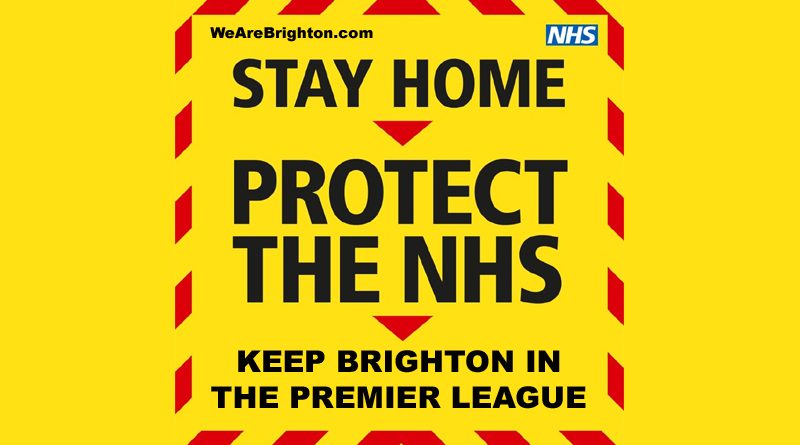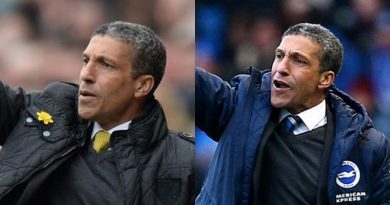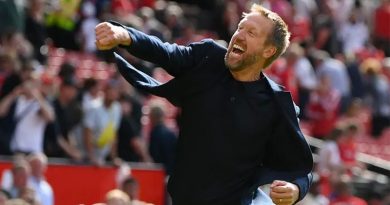How lockdown helped save Brighton & Hove Albion’s season
Cast your mind back to Saturday February 29th 2020. Brighton & Hove Albion had just been out-thought and out-battled by arch rivals Crystal Palace at the Amex, losing 1-0 thanks to the latest ghastly performance in a ghastly 2020.
The defeat extended the Albion’s winless start to the calendar year to nine games. It meant that since handing Graham Potter a new six-year deal in November, Brighton had won just twice in 18 matches – the exact same form that cost Chris Hughton his job – failing to beat relegation rivals Plucky Little Bournemouth, Aston Villa, Watford and West Ham United.
With the likes of Arsenal, Leicester City, Manchester United, Liverpool and Manchester City still to play in a ridiculously tough final nine fixtures, the threat of relegation was suddenly very real and looming large.
The players looked bereft of confidence, goals were less frequent than demand for a package holiday to Wuhan and Potter was making increasingly bizarre decisions. Remember Dale Stephens at right back? It was difficult to see where the next three points were coming from.
Had the season continued in that vein over its final two months, then the Albion could very easily have found themselves finishing in the bottom three. Hello Barnsley, Luton and Rotherham in the Championship for 2020-21.
And then lockdown came along. Since football in England was forced into a three month break, Brighton have transformed their campaign in a way that no other Premier League team has been able to match.
Six points from 10 games before lockdown has become seven points from four games for Brighton since the season resumed. It is chalk and cheese – which is why anyone who suggested back in February that the Albion would beat Arsenal and Norwich and draw with Leicester would have found themselves sectioned very quickly.
Lockdown has saved Brighton & Hove Albion’s season – and perhaps, the whole Potter project if relegation would have led Tony Bloom seek a managerial change. Here’s why those 15 weeks off have made such a difference to the Seagulls.
Graham Potter has put his Masters in Emotional Intelligence to good use
Potter’s somewhat whacky ideas about the mental side of the game need no introduction. Tales of his Ostersunds squad performing Swan Lake for supporters while he himself sung the Lapland national anthem in a native dialect on stage have become the stuff of legend.
Sadly, we are yet to see Shane Duffy or Lewis Dunk sporting a tutu and dancing around the Theatre Royal in a production of Don Quixote. That doesn’t mean that Potter hasn’t put his masters in leadership and emotional intelligence to good use at the Albion though.
His expertise and focus on mentality would have proven invaluable during lockdown, when players’ mental health was tested through isolation, self-training and all the other challenges they and the rest of the nation had to face.
Potter has involved the players in the decision making process every step of the way. Captain Lewis Dunk and senior player Glenn Murray were consulted by the coaching team about the return to training, while Paul Barber sought their views on what the Albion’s position should be when it came to the season resuming.
Steve Sidwell said in his role as a Premier League pundit before Saturday’s victory over Norwich that the attention to detail Potter had put into helping his squad with the mental impact of lockdown was staggering.
No other top flight club possess a manager with that sort of skill set, which may explain why hardly any club has come back all guns blazing like Brighton have. For that, Potter deserves a huge amount of credit.
The benefits of extra time on the training ground
In many ways, these nine post-lockdown games are their own mini season rather than a continuation of 2019-20. The 15 weeks which the players had between the 0-0 Wolverhampton Wanderers draw and the 2-1 win over Arsenal represented a longer break than they get over the summer.
There has also been a mini pre-season of sorts. Before the campaign resumed, Potter and his coaching staff had three weeks of training with their entire squad in which they could focus on getting their ideas across without the distractions of planning for matches.
The difference in playing style and tactics between Potter and Hughton is such that most Brighton fans accepted that Potter would need at the very least another pre-season to completely overhaul the culture of the club.
Lockdown has rather fortunately given him that second pre-season with nine games of his first campaign still to play. Hence we have seen a Brighton side who have looked more capable of playing Potterball in these post lockdown matches.
The most clear evidence of this is that the goals given away by players making stupid mistakes in possession that littered the earlier season – Bournemouth away was a horror show in that regard – seem to have been ironed out.
Don’t underestimate how much of that is due to the work that has gone on at the training ground. Potter should be thanking his lucky stars for the extra time he’s been gifted with the players.
Tariq Lamptey and Alexis Mac Allister
Before lockdown, Tariq Lamptey and Alexis Mac Allister had featured for a grand total of 10 minutes between them since both arrived at Brighton in January.
They were two young players who needed time to bed into their new surroundings, particularly Mac Allister who was adjusting to life in a country far removed from his Argentinian homeland. Their chances of making much of an impact on the survival battle seemed limited.
Then Lockdown came along. Lamptey and Mac Allister have had three extra months to become accustomed to Brighton and what Potter wants from them.
As a result, both are now first team regulars. Mac Allister played a part in Neal Maupay’s winner against Arsenal and Lamptey has been man-of-the-match in two of his three starts.
They have added depth and quality to Potter’s squad which they may not have been able to offer had the season not been interrupted.
Rebuilt players confidence
Arguably the biggest benefit of lockdown has been that it gave Brighton 15 weeks to rebuild confidence after a pretty abysmal run of results and performances.
The break couldn’t have come at a better time for the Albion in that regard. What makes the timing even better is that it couldn’t have come at a worse time for Brighton & Hove Albion’s relegation rivals, all of whom have gone completely off the boil since lockdown.
Any momentum that Watford might have been able to build after becoming the first side to beat Liverpool in the Premier League this season was brought to a crushing halt. Nigel Pearson’s side have picked up one point since lockdown.
Bournemouth have been pretty dire all season, but they had beaten the Albion and Aston Villa and picked up a point from Chelsea in the six weeks before the season halted. Since football resumed, they have lost every game – including shipping nine goals from their two home matches against Palace and Newcastle United.
Aston Villa have been in free fall for a while so lockdown has made bugger all difference to them – Norwich however went into the break having beaten Leicester and eliminated Tottenham Hotspur from the FA Cup. The Canaries’ record reads four defeats from four since the restart and not a single goal scored.
That contrasting form between Brighton and the bottom five is ultimately what leaves the Albion all but safe with five games still to play. A remarkable turnaround from where we were back in March.
Suddenly, Brighton’s focus can shift up the Premier League table rather than down. The Albion’s current total of 36 points already equals last season’s haul. Five more will see Brighton eclipse their 2017-18 total of 40.
13th is the Albion’s highest ever top flight finish and is now just six points away. The side who currently occupy that spot? Palace. Brighton could yet find themselves finishing above their rivals come the end of the campaign and recording the best league placing in their history in the process.
That would have been unthinkable as we all slunk away from the Amex back in February, having just seen Jordan Ayew inflict further misery on a season that was threatening to go completely off the rails.
Which is why lockdown has saved Brighton’s season.




